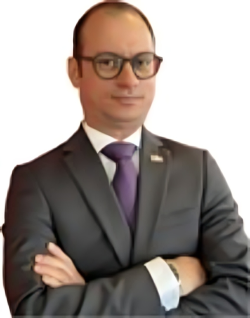Foster AI accessibility for building inclusive knowledge Societies: a multi-stakeholder reflection on WSIS+20 review
UNESCO Information for All Program (IFAP)
Session 201
The UNESCO Information for All Programme (IFAP) through involving its Working Groups on Information Ethics and Information Accessibility is organizing a workshop entitled: “Fostering AI accessibility for building inclusive Knowledge Societies”. This multi-stakeholder and multi-disciplinary discussion will contribute to the WSIS+20 review process by providing a guidance framework addressing opportunities and challenges posed by the current digital landscape.
As a tangible action of enhancing this multi-stakeholder discussion, UNESCO will also launch the newly founded IGF Dynamic Coalition (DC) on Measuring Digital Inclusion. This coalition includes key organizations including the International Federation of Library Associations and Institutions (IFLA), the Regional Centre for Studies on the Development of the Information Society (CETIC), the United Nations University Group on Electronic Governance (UNU-EGOV), and Tech and Global Affairs Innovation Hub.
Aligned with the IFAP Strategic Plan 2023-2029, the workshop will address a range of issues focusing on the promotion of accessibility through Artificial Intelligence (AI) and Ethics, critical aspects that have already been highlighted during the IFAP-organized AI for Accessibility Conference series and brainstorming sessions on AI Ethics. The goal is to raise awareness regarding the imperative of ensuring inclusion and participation of groups left behind including women and girls as well as persons with disabilities to be promoted throughout the AI value chain.
Additionally, the workshop will aims to catalyse partnerships to support these efforts and facilitate dynamic exchanges between IFAP Working Groups experts, the IFAP Secretariat, and a diverse array of stakeholders of Dynamic Coalition for fostering collaborative solutions and leveraging diverse perspectives to address the complex challenges at the intersection of AI accessibility and digital inclusion effectively.
The subject matter intersects with several WSIS Action lines: C3 Access to information, C8 Cultural Diversity and C10 Ethical dimension of information society. Moreover, the outcomes of these discussions can significantly contribute to the WSIS+20 review process by producing policy recommendations in the form of policy briefs and to be disseminated among Member States and WSIS stakeholders.

Pablo Medina Jimenez currently serves as the Chair Information for All Program (IFAP) at UNESCO.
He is the President of the Preparatory Group of the Executive Board and has also served as the Interim President of the Program and External Relations Commission (PX) of the Executive Board. Additionally, he was the Rapporteur for the Management of Social Transformations (MOST) Programme in the Social and Human Sciences (SHS) sector and the Vice-President of the International Programme for the Development of Communication (IPDC) in the Communication and Information sector.
Before his current role at UNESCO, Mr. Medina Jimenez was the Minister Counselor at the Permanent Mission of the Dominican Republic to the United Nations in Geneva. In this capacity, he assumed several regional responsibilities within the Group of Latin American and Caribbean States (GRULAC) across various UN agencies in Geneva.
Mr. Medina Jimenez also participated as a panelist at the Global Conference on World Press Freedom Day 2022 in Uruguay, showcasing his commitment to promoting press freedom and international communication.

Dr. Xianhong Hu is UNESCO's Programme Specialist at the Sector of Communication and Information since 2006. She serves on the Secretariat of UNESCO’s Intergovernmental Program of Information for All (IFAP) and leads UNESCO project of Internet Universality R.O.A.M principles (Rights, Openness, Accessibility, Multi-stakeholder) indicators.
Her expertise and responsibilities are in the areas of freedom of expression, access to information, privacy, journalism, media development, Internet governance, digital transformation and AI governance. She has followed the UN led processes of the World Summit of the Information Society (WSIS) and Internet Governance Forum (IGF). Her policy work relates to apply ROAM principles to govern the Artificial Intelligence and other emerging technologies, through her recent co-authored UNESCO study Steering AI and Advanced ICTs for Knowledge Societies: A ROAM Perspective.
.jpg?maxwidth=250)
Onica Makwakwa is an experienced digital development professional working at the intersection of technology and policy to advance access to affordable and meaningful connectivity. She led the multi-stakeholder engagement across Africa for the Alliance for Affordable Internet focusing on advancing good practices in policy and regulatory frameworks for affordable and meaningful access to broadband where she also convened the Africa Summit on Women and Girls in Technology. A founding director of The Wise Collective, a feminist organization advancing implementation of gender equality commitments across society. Onica is also a doctoral student at the University of Illinois at Urbana-Champaign where she’s studying Global Education with research interests in digital inclusion. She has managed and pioneered various national and international campaigns, policy change processes for women’s rights, civil rights, consumer rights, as well as media and digital transformation initiatives. She brings a strong sensitivity and unique perspective to the dynamics affecting women, and other disadvantaged populations.

Alexandre Barbosa is Head of the Center of Studies for Information and Communications Technologies (CETIC.br), an UNESCO Category II Center for the development of information society based in Sao Paulo, Brazil. Mr. Barbosa is in charge of several nationwide ICT Survey projects in Brazil aimed at the production of ICT-related statistics and indicators.
Mr. Barbosa holds a PhD degree in Business Administration from Getulio Vargas Foundation, a Master Degree in Business Administration from Bradford University, a Master Degree in Computer Science from Federal University of Minas Gerais, and a Bachelor of Science Degree in Electrical Engineering from Catholic University. He has conducted postdoctoral research at HEC Montreal in Canada.

Maja Maricevic is Head of Science and Innovation at the British Library. Maja is particularly interested in the big challenges of our time, such as the continuing digital transformation and climate change. Maja is an Advisory Board Member of the Arts and Humanities Research Council and an Advisory Board Member for the UK Research and Innovation programme Building a Greener Future. She is also a Board member of London’s Knowledge Quarter. She has previously worked in universities, government departments and as a professional consultant for PricewaterhouseCoopers.

Yves Poullet is the Director of CRIDS since its creation in 1979 until August 31, 2010, he conducted various researches in the field of new technologies with a special emphasis on privacy issues, of individual and public freedom in the Information Society and of Internet Governance. Moreover, he is full professor at the Faculty of Law at the University of Namur (UNamur) and Liège (Ulg).
He has been during 12 years (1992-2004) member of the Belgian Commission on Data Protection (Commission belge de protection de la vie privée). In addition, he was since its origin, member of Legal Advisory Board of European Commission and the president of the Task Force "Electronic Democracy and Access to public records". He is a founder of the European Telecommunication Forum, ECLIP and FIRILITE. He also chaired the Belgian Computer Association ABDI (Association Belge de Droit de l'Informatique).

Fabio Senne is the Project Coordinator at the Regional Center for Studies on the Development of the Information Society (Cetic.br), linked to the Brazilian Network Information Center (NIC.br). PhD degree in Political Science from the University of São Paulo (Brazil), a Master Degree in Communication from University of Brasília (Brazil) and a BSc Degree in Social Sciences from the University of São Paulo (Brazil). Researcher in the field of digital inequalities, his area of expertise is the relationship between the digital technologies and social policies, poverty and inequalities.
-
 C3. Access to information and knowledge
C3. Access to information and knowledge
-
 C8. Cultural diversity and identity, linguistic diversity and local content
C8. Cultural diversity and identity, linguistic diversity and local content
-
 C10. Ethical dimensions of the Information Society
C10. Ethical dimensions of the Information Society
The subject matter intersects with several WSIS Action lines: C3 Access to information, C8 Cultural Diversity and C10 Ethical dimension of information society. Moreover, the outcomes of these discussions can significantly contribute to the WSIS+20 review process by producing policy recommendations in the form of policy briefs and to be disseminated among Member States and WSIS stakeholders.
-
 Goal 4: Ensure inclusive and equitable quality education and promote lifelong learning opportunities for all
Goal 4: Ensure inclusive and equitable quality education and promote lifelong learning opportunities for all
-
 Goal 16: Promote just, peaceful and inclusive societies
Goal 16: Promote just, peaceful and inclusive societies
This multi-stakeholder and multi-disciplinary discussion will contribute to SDG 4 and 16 by providing inputs and recommendations to tackle digital divides and various challenges posed by the current digital landscape.
https://www.unesco.org/en/ifap; https://intgovforum.org/en/content/dynamic-coalition-on-measuring-digital-inclusion-dc-digital-inclusion